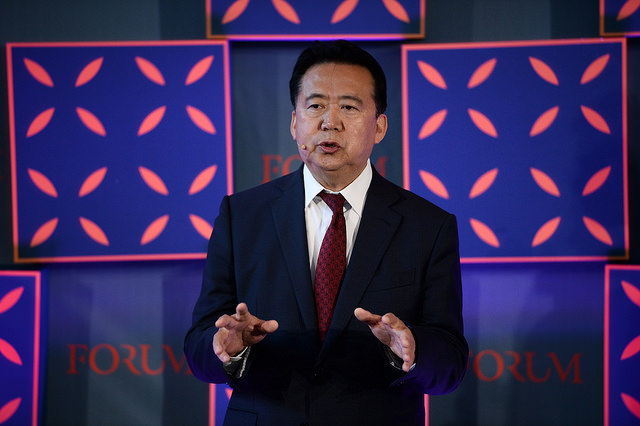China could pull Interpol funding after Meng Hongwei’s arrest
Posted By John Coyne on October 9, 2018 @ 11:27

Interpol, the world’s pre-eminent international policing organisation, is a busy place at the best of times. Facilitating international police cooperation among its 192 members in a world where crime is increasingly transnational and geopolitical relationships are fraught is tough.
It must have been rather inconvenient, then, for its executive to deal with the disappearance of its president [1], Meng Hongwei [2], in late September. Meng’s exact whereabouts are still unknown, but some light was shed on his situation when the Chinese government announced he was under investigation by an anti-corruption body for allegedly taking bribes and violating the law [3]. Interpol later said it had received his resignation, effective immediately.
Meng also held the position of vice minister of public security, was both well connected and respected in the powerful ministry, and was a long-time member of the Chinese Communist Party.
His election as president by the Interpol general assembly in November 2016 was testament to his reputation and a matter of great pride for a Chinese government striving for greater global influence.
Meng was an active president. He focused on reforming Interpol and appears to have been actively engaged with the organisation’s executive committee and general secretariat. He sought to bring the 70-year-old agency into the 21st century, overseeing the development of clearer structures for cooperation and innovation.
Interpol, with Meng’s influence, played an important role in Chinese president Xi Jinping’s crackdown on corruption and dissidents. Interpol itself was pivotal in the pursuit of corrupt Chinese officials who had fled the country. Meng’s leadership also provided a mechanism to legitimise China’s international efforts to silence critics among its diaspora.
Meng was the face of China’s active engagement with Interpol. By September 2017, the Chinese government had over 3,000 active investigations being actioned through Interpol, with some 200 red notices—international arrest warrants—submitted by Chinese authorities. Meng also championed greater Chinese involvement in the planning and development of Interpol.
Despite his good work, more than a few members of the Interpol executive committee were concerned that China was using the international policing organisation to pursue dissidents and outspoken members of its diaspora.
Meng was a poster boy for the Chinese government’s international branding: a qualified and capable Chinese bureaucrat navigating the fine line between international obligations and Chinese policy while serving in an international government organisation. His speech [4] at the opening of the 86th Interpol general assembly on 26 September last year illustrates this point:
We had the pleasure of hearing a far-reaching speech from President Xi, a demonstration of his strategic foresight and leadership. His recognition of the vital role of INTERPOL and announcement of generous support on behalf of the Chinese government are an inspiration for us. I am sure that the counsel and contribution from China will give a significant boost to this meeting, the future of INTERPOL and the security landscape worldwide.
So is Meng’s arrest part of Xi’s crackdown on corruption or a case of an official who crossed a line defined by the Chinese Communist Party?
It seems, from a Western perspective, that Chinese officials must have feared something significant to have taken an action that has not only jeopardised Meng’s successes at Interpol but also further tarnished China’s international reputation.
From a Chinese government perspective, there are two likely reasons for this action. One is that Meng was involved in such egregious corruption that its imminent discovery would harm the party. The second is that the party had lost faith in Meng’s loyalty.
There can be no doubt that Meng’s long-term engagement with the Ministry of Public Security and role as vice minister had, at the very least, put him in contact with officials involved in corruption. If Meng himself wasn’t involved in such activities, he would have known where the bodies were buried—figuratively and perhaps literally. But if corruption was the reason, then it seems reasonable to ask why the Chinese government didn’t handle the whole issue through Interpol, as it has done with thousands of other cases.
It seems unlikely that we’ll know the truth for some time, if ever.
If the media coverage is anything to go by, the Chinese government’s ‘disappearing’ of the head of an international organisation merits substantial attention. But in China domestic security and the party come before all else and negative foreign press is unlikely to move the country’s leadership.
Nevertheless, Interpol is in good hands despite the loss of Meng. Much of the day-to-day responsibility for its activities resides with Secretary General Jürgen Stock, who has more than 40 years of law enforcement experience. South Korea’s Kim Jong Yang will be Interpol’s acting president [5] until a new one is elected at the next general assembly in November.
Interpol has long struggled to find the resources necessary to realise its full potential. For the most part, its budget has been dependent on donor money from member countries. When Meng was at the helm, Interpol received offers of new support from the Chinese government. While the Chinese government hasn’t yet cut its support for Interpol, it’s likely that it will, given that it now has no representatives on the organisation’s secretariat or executive council. For the time being, at least, there’s a big question mark over the future of Chinese financial support for Interpol’s reform agenda.
China says Meng’s arrest shows its unwavering determination [3] to ‘combat corruption and criminal activities’. What it means for Interpol and the future Chinese leadership of international organisations remains to be seen.
Article printed from The Strategist: https://www.aspistrategist.org.au
URL to article: https://www.aspistrategist.org.au/china-could-pull-interpol-funding-after-meng-hongweis-arrest/
URLs in this post:
[1] president: https://www.interpol.int/en/About-INTERPOL/Structure-and-governance/President
[2] Meng Hongwei: https://www.interpol.int/en/About-INTERPOL/Structure-and-governance/Meng-Hongwei
[3] taking bribes and violating the law: https://www.fmprc.gov.cn/mfa_eng/xwfw_665399/s2510_665401/t1602635.shtml
[4] speech: https://www.interpol.int/content/download/35968/465730/version/8/file/Speech%20by%20President%20Meng%20Hongwei%2086GAdocx.pdf
[5] acting president: https://twitter.com/INTERPOL_HQ/status/1049003122046259201
Click here to print.